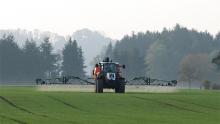PHC2020/09: Economic Impact of Pesticide Withdrawals to Scotland, with Case Studies

Chemical forms of plant protection are widely used in Scottish agricultural, horticultural and forestry production plus for amenity and natural environment management purposes. The availability and use of active substances in pesticides are closely regulated and increasing concern over human health and environmental impacts has led to a greater likelihood that some existing approvals will be withdrawn and/or that approvals for new products will not be granted. Potential impacts from withdrawal of these pesticides are of policy interest and this summary report builds on the data and results from project PHC2018/15 (Potential impacts arising from pesticide withdrawals to Scotland’s plant health) and uses case studies to understand the likely magnitude and distribution of potential impacts and how they may be mitigated.
The key outcomes include:
- The severity of likely impact varies, reflecting sectoral differences in current reliance on key active substances. Strawberries, raspberries, legumes, brassicas and carrots may be particularly vulnerable.
- Advice, training and funding for Integrated Pest Management across all sectors has a role to play in demonstrating commitment to deploying alternative control measures to reduce pesticide usage.
- Commitment to alternative measures and to stewardship of key substances as part of a mix of controls may help to delay complete withdrawals.
